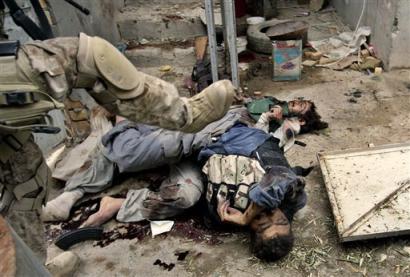Entered into the database on Thursday, July 21st, 2005 @ 10:23:50 MST
CUENCA (ECUADOR), JULY 19: At the second international People’s Health Assembly,
which began here yesterday, Iraqi and Palestinian delegations are counting war’s
casualties off the field. Before delegates from 83 world nations, Iraqi medic Salam Taha Ismail recounts
the shock of heavy calibre bullets from the US sniper tearing through his ambulance
top two years ago. He and his nurse had jumped into the ambulance and rushed
to a Fallujah street after someone informed their field hospital that a car
was hit by a missile. ‘‘Each time we tried to open the ambulance door and get to the
car, the sniper in a nearby building would fire. We got shot at many times.
Soon the car was a burning heap and we watched its occupants burn to cinder,
recalls Salam. He is heading the Iraqi delegation to the PHA. But after living and working in devastated Fallujah for seven years, Salam
had seen much. US troops had arrested and beat him up thrice and brought down
his home. ‘‘Once they took my family to the balcony and handed a
revolver to my old father. They suggested that he shoot himself, he told The
Indian Express. Salam is now senior general surgeon at the Baghdad General Hospital.
‘‘I had never spoken out before. Back home, we aren’t allowed
to talk to the press,” he says. Salam says the worst was the siege of Fallujah. ‘‘They bombed out
the bridges and about half a million people had no way to get to a doctor. We
managed to construct five field hospitals...we were deluged with cluster-bomb
victims, and those who stepped on landmines. Legs and hands needed to be amputed
fast, and there weren’t many saws, anesthetics or even sutures to go around.
So we often used bone crushers to sever legs and hands, using local anesthetics,
and cloth needles and thread to sew them up. The victims still turn up by the
dozen.” Now, Salem says Iraq has a 7.5 per cent incidence of severe malnutrition, ‘‘much
more than in many African countries”. But the 13-year-long sanctions preceding
the invasion did worse. ‘‘It led to over a million deaths, destroyed
most of our social and health infrastructure, until the bombings began.” Iraq’s plight finds an echo in Palestine. ‘‘We have had almost
our entire healthcare infrastructure in Gaza and the West Bank wiped out,”
says Dr Hassan Hamda, president of the Palestine Medical Relief Society. ‘‘The
Israelis aren’t just attacking hospitals and clinics, they are now stopping
movement of doctors and paramedics too”, he said. ‘‘In Naples,
where I come from, the wall that the Israelis have built has cut off almost
73 per cent of the population in the rural side from medicare.”